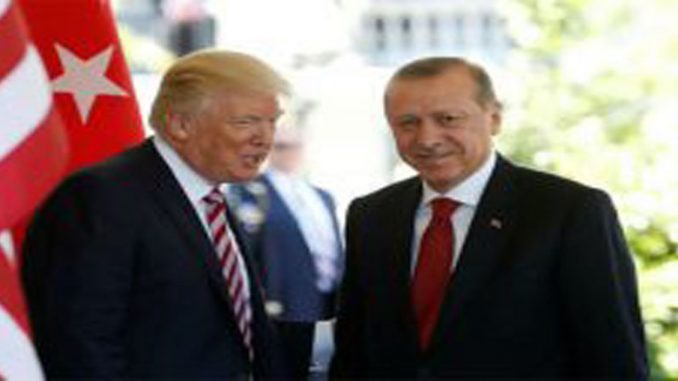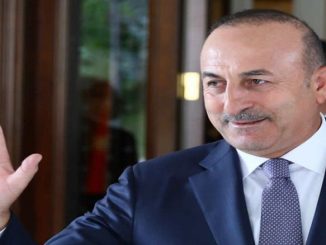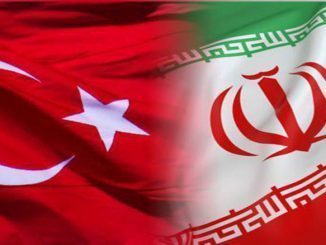
The two leaders are meeting against a backdrop of strained diplomatic and military ties between Ankara and Washington.
Fresh on the heels of yet another crisis point in an increasingly fraught relationship, Turkish President Recep Tayyip Erdogan is due to meet with US President Donald Trump on Wednesday in Washington, DC.
Political and security ties between Ankara and Washington frayed considerably this year after Turkey took delivery of Russian-made S-400 missiles in July, and Ankara launched military action in October against Kurdish YPG fighters in the northeast Syria.
Trump has drawn sharp criticism from Democrats – and members of his own party – for withdrawing US forces from the region – a move which paved the way for Turkish troops to commence their campaign against Syrian Democratic Forces who were allied with the US against the Islamic State of Iraq and the Levant (ISIL or ISIS).
On Twitter, Trump struck a belligerent tone, threatening to “obliterate” Turkey’s economy if Ankara did anything “off-limits” to the Kurdish fighters.
While such posturing may have helped curb the Turkish military operation, it was not enough to undermine what some call a “special relationship” between Erdogan and Trump that has seen the White House tread lightly with punitive measures urged by the US lawmakers and allies.
Sanctions on sanctions off
Following the withdrawal of US troops, Turkey was given the green light by Trump to advance across its southern border on October 9 to establish a safe zone, free of Kurdish YPG fighters.
The YPG is viewed by Turkey as an offshoot of the armed Kurdistan Workers’ Party (PKK) – considered by Ankara and many Western countries a terrorist organization – whose campaign for autonomy has killed tens of thousands of people over the past 35 years.
Amid international pressure – and domestic uproar – Trump promised devastating sanctions if Erdogan crossed any red lines.
The US Department of the Treasury on October 14 imposed sanctions on two Turkish ministries and three senior Turkish officials – which Trump lifted following a ceasefire deal – but they were not nearly as severe as those urged by US lawmakers or enacted by several countries in Europe.
“One of the reasons Turkey agreed to a ceasefire during [US Vice President Mike] Pence visit is Ankara’s concern over sanctions,” said Gonul Tol, director of the Middle East Institute’s Center for Turkish Studies.
“But the threat of sanctions could have had a bigger impact on Turkish behavior if Erdogan did not think Trump had his back,” she told Al Jazeera. “Erdogan relies on his ‘special relationship’ with Trump to avoid sanctions.”
‘Walk a delicate line’
Tol says if the US’s relationship with Turkey were “entirely” up to Trump, he would maintain a tight bond.
“But given [Trump’s] domestic woes and the tension with a Congress in which there is bipartisan consensus on the need to punish Erdogan, it is getting more difficult for Trump to keep standing by Erdogan,” she said, adding that “he has to walk a delicate line”.
One of the biggest rifts between Ankara and Washington opened this July when Turkey received an S-400 missile defense system from Russia.
Washington responded by excluding Turkey, a NATO ally, from the F-35 fighter jet program in which Ankara had participated as both a purchaser and parts manufacturer.
Muhittin Ataman, an Ankara-based Turkish professor of international relations, told Al Jazeera that the US had no valid argument to impose sanctions on Turkey.
“The issue of US sanctions on Turkey resurfaced after Ankara launched Operation Peace Spring with the aim of punishing Ankara for it,” Ataman told Al Jazeera.
“However, the current situation in the operation area [in northeast Syria] has also been endorsed by the US as Ankara and Washington signed a ceasefire deal on it last month,” he said.
“S-400s have been an issue between the two allies for a while now. The purchasing process of the defense system started last year and concluded in the summer. And no sanctions have been imposed until now,” Ataman said.
According to Ataman, imposing sanctions over a done deal did not make sense, stressing that some of the S-400s have already been delivered to Turkey.
“Erdogan is expected to relay these arguments to Trump during the meeting and convince him not to implement any US Congress move against Turkey,” Ataman said.
Ahead of Wednesday’s meeting, White House National Security Adviser Robert O’Brien said Ankara would face fresh sanctions if it does not “get rid” of the anti-aircraft weapons.
“Turkey will feel the impact of those sanctions,” O’Brien told CBS’s Face the Nation on Sunday, referring to legally mandated punitive measures under the Countering America’s Adversaries Through Sanctions Act (CAATSA), which he said could fly through Congress with “overwhelming” support.
“There’s no place in NATO for the S-400,” said O’Brien. “That’s a message that the president will deliver to [Erdogan] very clearly when he’s here.”
But some experts say such threats are hollow, given the Trump administration’s failure thus far to follow through with sanctions already authorized by the US Congress under CAATSA.
“US use of sanctions toward Turkey has proved a colossal deterrence failure,” said Lisel Hintz, an assistant professor of international relations and European studies at Johns Hopkins University’s School of Advanced International Studies.
“The delay on CAATSA sanctions implementation, despite massive bipartisan pressure from Congress, indeed, sends completely the opposite signal,” she told Al Jazeera.
Turkey is scheduled to fully activate the S-400 system by spring. While postponing that could go a long way towards defusing tensions with Washington, Erdogan may not want to be seen as caving to US pressure by scrapping the missile system entirely.
Ankara could yet pivot back, some analysts say, by keeping the S-400 parts inactive in a warehouse, with Washington rewarding such a decision by bringing Turkey back into the F-35 program.
US legal problems for Turkey’s majority state-owned Halkbank – accused of evading Iran sanctions – could also be a key topic for discussion by the two presidents.
But as Erdogan strives to build a more independent role for Turkey in a turbulent region, Hintz says that Ankara’s “transactional relationship with Russia currently trumps adhering to US demands”.
Close family ties
While their countries find themselves at loggerheads diplomatically, the ties binding Trump and Erdogan go beyond their shared status as leaders. Jared Kushner, who is married to Trump’s daughter Ivanka, has cultivated warm relations with Berat Albayrak, Erdogan’s son-in-law and finance minister.
Another thread runs from Ankara to the White House through Mehmet Ali Yalcindag, the scion of a Turkish construction family who was described by Trump at the 2012 opening of Trump Towers Istanbul as Ivanka’s “great friend”.
While Trump’s US critics – including officials from the administration of former US President George W Bush – have decried what they call “crony capitalist” channels between the NATO members, Erdogan himself has expressed great hopes that this “bridge” can overcome obstacles posed by the “deep state” in both nations.
Breaking even one impasse could be beneficial to both leaders. Smoothing over relations with Washington might give Erdogan more room to manoeuvre as Europe baulks at Ankara’s deportation policies on ISIL prisoners captured in Syria and mulls sanctions over Turkey’s natural gas drilling near Cyprus.
Meanwhile, Trump has plenty of battles on the homefront as he fights impeachment efforts by Democrats in Congress and seeks re-election next year.
“For all his bluster, Trump seems to be preserving ties with Turkey on terms overwhelmingly favourable to Erdogan’s interests,” Hintz said, adding Trump again could hand “the Turkish president nearly everything”.



